Management & Leadership: Theories, Styles & Skills in Service Org
VerifiedAdded on 2023/06/14
|22
|7824
|229
Report
AI Summary
This report provides a comprehensive analysis of management and leadership within the service industry, focusing on Park Plaza Hotel as a case study. It assesses classical management theories like Scientific Management, Bureaucratic Theory, Administrative Theory and Human Relations theory, applying them to the service context. The report examines the roles of leaders and different leadership styles, internal and external factors influencing management, and the hard and soft skills required for effective leadership. Furthermore, it discusses future management skills and compares change management systems in different service organizations, offering a thorough evaluation of current and future leadership needs in the service sector. Desklib provides this and other solved assignments for students.
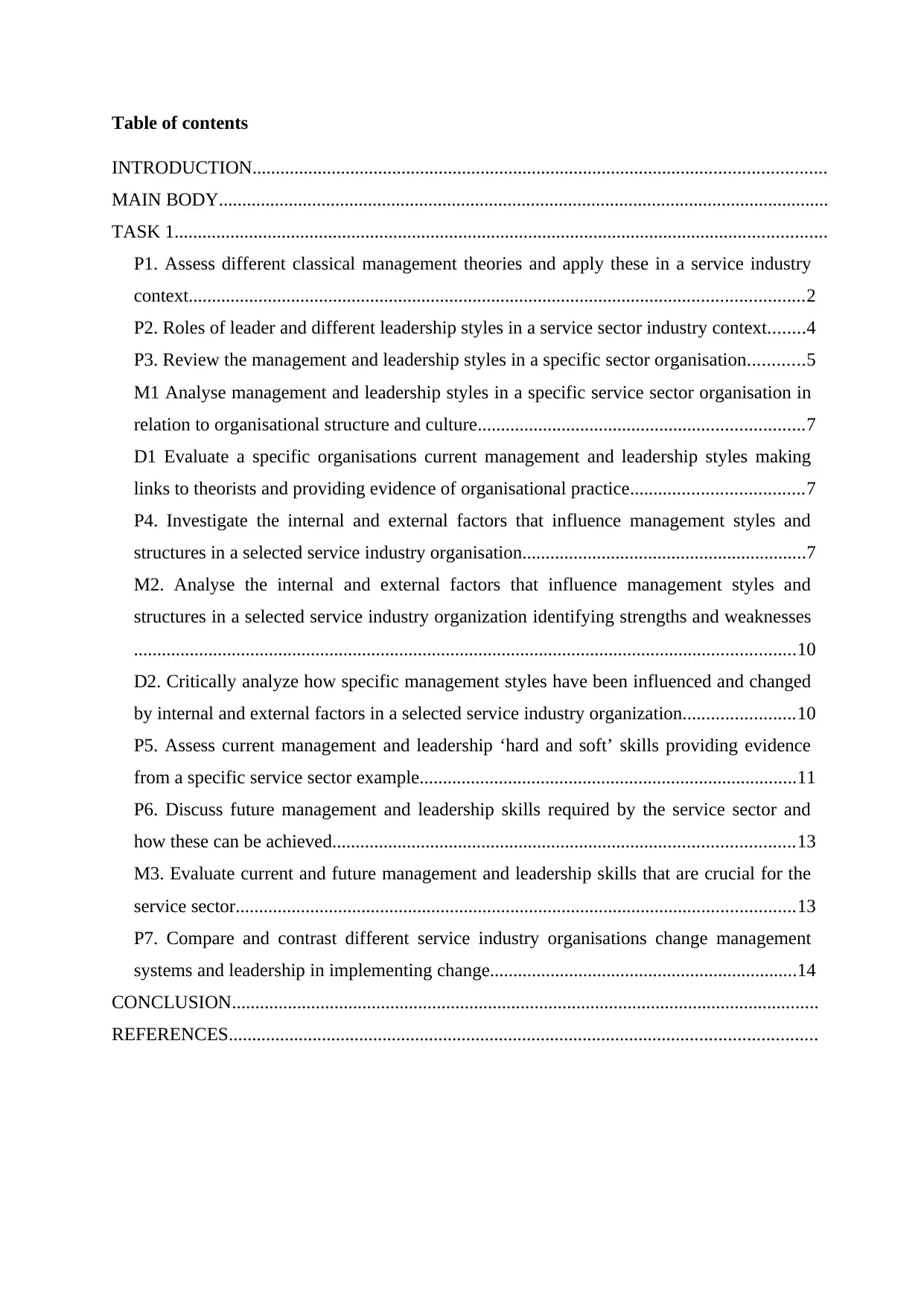
Table of contents
INTRODUCTION...........................................................................................................................
MAIN BODY...................................................................................................................................
TASK 1............................................................................................................................................
P1. Assess different classical management theories and apply these in a service industry
context....................................................................................................................................2
P2. Roles of leader and different leadership styles in a service sector industry context........4
P3. Review the management and leadership styles in a specific sector organisation............5
M1 Analyse management and leadership styles in a specific service sector organisation in
relation to organisational structure and culture......................................................................7
D1 Evaluate a specific organisations current management and leadership styles making
links to theorists and providing evidence of organisational practice.....................................7
P4. Investigate the internal and external factors that influence management styles and
structures in a selected service industry organisation.............................................................7
M2. Analyse the internal and external factors that influence management styles and
structures in a selected service industry organization identifying strengths and weaknesses
..............................................................................................................................................10
D2. Critically analyze how specific management styles have been influenced and changed
by internal and external factors in a selected service industry organization........................10
P5. Assess current management and leadership ‘hard and soft’ skills providing evidence
from a specific service sector example.................................................................................11
P6. Discuss future management and leadership skills required by the service sector and
how these can be achieved...................................................................................................13
M3. Evaluate current and future management and leadership skills that are crucial for the
service sector........................................................................................................................13
P7. Compare and contrast different service industry organisations change management
systems and leadership in implementing change..................................................................14
CONCLUSION..............................................................................................................................
REFERENCES..............................................................................................................................
INTRODUCTION...........................................................................................................................
MAIN BODY...................................................................................................................................
TASK 1............................................................................................................................................
P1. Assess different classical management theories and apply these in a service industry
context....................................................................................................................................2
P2. Roles of leader and different leadership styles in a service sector industry context........4
P3. Review the management and leadership styles in a specific sector organisation............5
M1 Analyse management and leadership styles in a specific service sector organisation in
relation to organisational structure and culture......................................................................7
D1 Evaluate a specific organisations current management and leadership styles making
links to theorists and providing evidence of organisational practice.....................................7
P4. Investigate the internal and external factors that influence management styles and
structures in a selected service industry organisation.............................................................7
M2. Analyse the internal and external factors that influence management styles and
structures in a selected service industry organization identifying strengths and weaknesses
..............................................................................................................................................10
D2. Critically analyze how specific management styles have been influenced and changed
by internal and external factors in a selected service industry organization........................10
P5. Assess current management and leadership ‘hard and soft’ skills providing evidence
from a specific service sector example.................................................................................11
P6. Discuss future management and leadership skills required by the service sector and
how these can be achieved...................................................................................................13
M3. Evaluate current and future management and leadership skills that are crucial for the
service sector........................................................................................................................13
P7. Compare and contrast different service industry organisations change management
systems and leadership in implementing change..................................................................14
CONCLUSION..............................................................................................................................
REFERENCES..............................................................................................................................
Paraphrase This Document
Need a fresh take? Get an instant paraphrase of this document with our AI Paraphraser
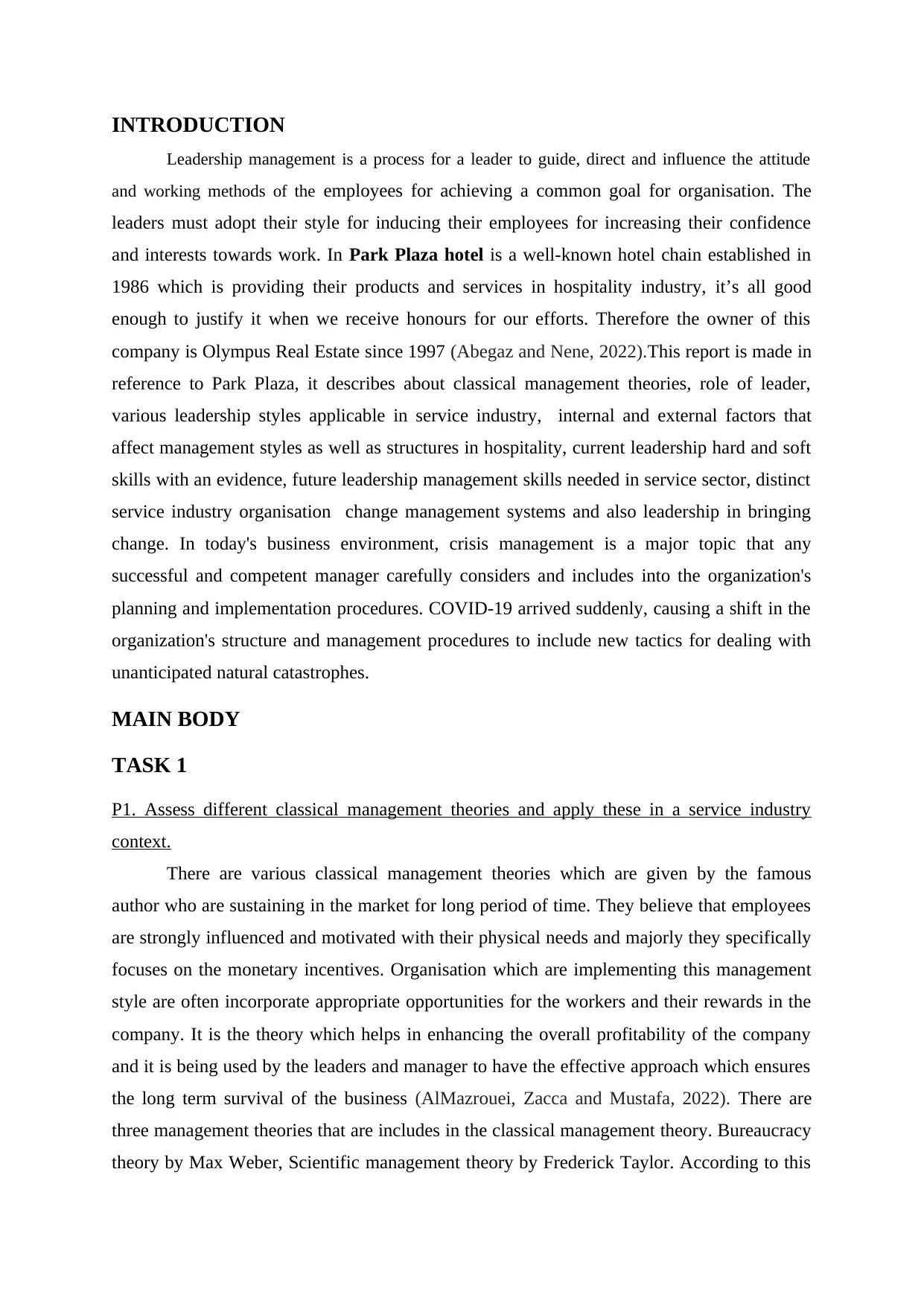
INTRODUCTION
Leadership management is a process for a leader to guide, direct and influence the attitude
and working methods of the employees for achieving a common goal for organisation. The
leaders must adopt their style for inducing their employees for increasing their confidence
and interests towards work. In Park Plaza hotel is a well-known hotel chain established in
1986 which is providing their products and services in hospitality industry, it’s all good
enough to justify it when we receive honours for our efforts. Therefore the owner of this
company is Olympus Real Estate since 1997 (Abegaz and Nene, 2022).This report is made in
reference to Park Plaza, it describes about classical management theories, role of leader,
various leadership styles applicable in service industry, internal and external factors that
affect management styles as well as structures in hospitality, current leadership hard and soft
skills with an evidence, future leadership management skills needed in service sector, distinct
service industry organisation change management systems and also leadership in bringing
change. In today's business environment, crisis management is a major topic that any
successful and competent manager carefully considers and includes into the organization's
planning and implementation procedures. COVID-19 arrived suddenly, causing a shift in the
organization's structure and management procedures to include new tactics for dealing with
unanticipated natural catastrophes.
MAIN BODY
TASK 1
P1. Assess different classical management theories and apply these in a service industry
context.
There are various classical management theories which are given by the famous
author who are sustaining in the market for long period of time. They believe that employees
are strongly influenced and motivated with their physical needs and majorly they specifically
focuses on the monetary incentives. Organisation which are implementing this management
style are often incorporate appropriate opportunities for the workers and their rewards in the
company. It is the theory which helps in enhancing the overall profitability of the company
and it is being used by the leaders and manager to have the effective approach which ensures
the long term survival of the business (AlMazrouei, Zacca and Mustafa, 2022). There are
three management theories that are includes in the classical management theory. Bureaucracy
theory by Max Weber, Scientific management theory by Frederick Taylor. According to this
Leadership management is a process for a leader to guide, direct and influence the attitude
and working methods of the employees for achieving a common goal for organisation. The
leaders must adopt their style for inducing their employees for increasing their confidence
and interests towards work. In Park Plaza hotel is a well-known hotel chain established in
1986 which is providing their products and services in hospitality industry, it’s all good
enough to justify it when we receive honours for our efforts. Therefore the owner of this
company is Olympus Real Estate since 1997 (Abegaz and Nene, 2022).This report is made in
reference to Park Plaza, it describes about classical management theories, role of leader,
various leadership styles applicable in service industry, internal and external factors that
affect management styles as well as structures in hospitality, current leadership hard and soft
skills with an evidence, future leadership management skills needed in service sector, distinct
service industry organisation change management systems and also leadership in bringing
change. In today's business environment, crisis management is a major topic that any
successful and competent manager carefully considers and includes into the organization's
planning and implementation procedures. COVID-19 arrived suddenly, causing a shift in the
organization's structure and management procedures to include new tactics for dealing with
unanticipated natural catastrophes.
MAIN BODY
TASK 1
P1. Assess different classical management theories and apply these in a service industry
context.
There are various classical management theories which are given by the famous
author who are sustaining in the market for long period of time. They believe that employees
are strongly influenced and motivated with their physical needs and majorly they specifically
focuses on the monetary incentives. Organisation which are implementing this management
style are often incorporate appropriate opportunities for the workers and their rewards in the
company. It is the theory which helps in enhancing the overall profitability of the company
and it is being used by the leaders and manager to have the effective approach which ensures
the long term survival of the business (AlMazrouei, Zacca and Mustafa, 2022). There are
three management theories that are includes in the classical management theory. Bureaucracy
theory by Max Weber, Scientific management theory by Frederick Taylor. According to this
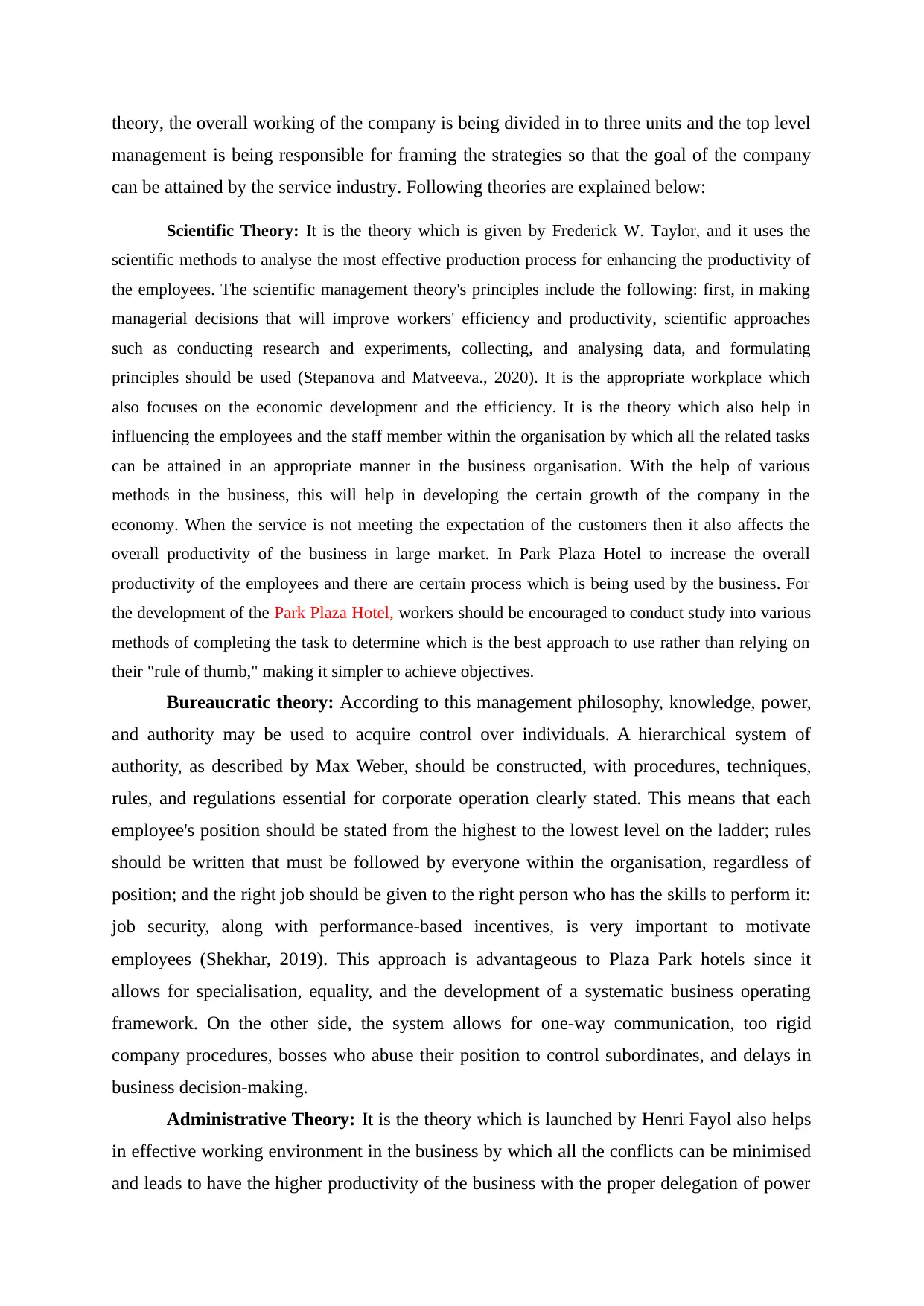
theory, the overall working of the company is being divided in to three units and the top level
management is being responsible for framing the strategies so that the goal of the company
can be attained by the service industry. Following theories are explained below:
Scientific Theory: It is the theory which is given by Frederick W. Taylor, and it uses the
scientific methods to analyse the most effective production process for enhancing the productivity of
the employees. The scientific management theory's principles include the following: first, in making
managerial decisions that will improve workers' efficiency and productivity, scientific approaches
such as conducting research and experiments, collecting, and analysing data, and formulating
principles should be used (Stepanova and Matveeva., 2020). It is the appropriate workplace which
also focuses on the economic development and the efficiency. It is the theory which also help in
influencing the employees and the staff member within the organisation by which all the related tasks
can be attained in an appropriate manner in the business organisation. With the help of various
methods in the business, this will help in developing the certain growth of the company in the
economy. When the service is not meeting the expectation of the customers then it also affects the
overall productivity of the business in large market. In Park Plaza Hotel to increase the overall
productivity of the employees and there are certain process which is being used by the business. For
the development of the Park Plaza Hotel, workers should be encouraged to conduct study into various
methods of completing the task to determine which is the best approach to use rather than relying on
their "rule of thumb," making it simpler to achieve objectives.
Bureaucratic theory: According to this management philosophy, knowledge, power,
and authority may be used to acquire control over individuals. A hierarchical system of
authority, as described by Max Weber, should be constructed, with procedures, techniques,
rules, and regulations essential for corporate operation clearly stated. This means that each
employee's position should be stated from the highest to the lowest level on the ladder; rules
should be written that must be followed by everyone within the organisation, regardless of
position; and the right job should be given to the right person who has the skills to perform it:
job security, along with performance-based incentives, is very important to motivate
employees (Shekhar, 2019). This approach is advantageous to Plaza Park hotels since it
allows for specialisation, equality, and the development of a systematic business operating
framework. On the other side, the system allows for one-way communication, too rigid
company procedures, bosses who abuse their position to control subordinates, and delays in
business decision-making.
Administrative Theory: It is the theory which is launched by Henri Fayol also helps
in effective working environment in the business by which all the conflicts can be minimised
and leads to have the higher productivity of the business with the proper delegation of power
management is being responsible for framing the strategies so that the goal of the company
can be attained by the service industry. Following theories are explained below:
Scientific Theory: It is the theory which is given by Frederick W. Taylor, and it uses the
scientific methods to analyse the most effective production process for enhancing the productivity of
the employees. The scientific management theory's principles include the following: first, in making
managerial decisions that will improve workers' efficiency and productivity, scientific approaches
such as conducting research and experiments, collecting, and analysing data, and formulating
principles should be used (Stepanova and Matveeva., 2020). It is the appropriate workplace which
also focuses on the economic development and the efficiency. It is the theory which also help in
influencing the employees and the staff member within the organisation by which all the related tasks
can be attained in an appropriate manner in the business organisation. With the help of various
methods in the business, this will help in developing the certain growth of the company in the
economy. When the service is not meeting the expectation of the customers then it also affects the
overall productivity of the business in large market. In Park Plaza Hotel to increase the overall
productivity of the employees and there are certain process which is being used by the business. For
the development of the Park Plaza Hotel, workers should be encouraged to conduct study into various
methods of completing the task to determine which is the best approach to use rather than relying on
their "rule of thumb," making it simpler to achieve objectives.
Bureaucratic theory: According to this management philosophy, knowledge, power,
and authority may be used to acquire control over individuals. A hierarchical system of
authority, as described by Max Weber, should be constructed, with procedures, techniques,
rules, and regulations essential for corporate operation clearly stated. This means that each
employee's position should be stated from the highest to the lowest level on the ladder; rules
should be written that must be followed by everyone within the organisation, regardless of
position; and the right job should be given to the right person who has the skills to perform it:
job security, along with performance-based incentives, is very important to motivate
employees (Shekhar, 2019). This approach is advantageous to Plaza Park hotels since it
allows for specialisation, equality, and the development of a systematic business operating
framework. On the other side, the system allows for one-way communication, too rigid
company procedures, bosses who abuse their position to control subordinates, and delays in
business decision-making.
Administrative Theory: It is the theory which is launched by Henri Fayol also helps
in effective working environment in the business by which all the conflicts can be minimised
and leads to have the higher productivity of the business with the proper delegation of power
⊘ This is a preview!⊘
Do you want full access?
Subscribe today to unlock all pages.

Trusted by 1+ million students worldwide
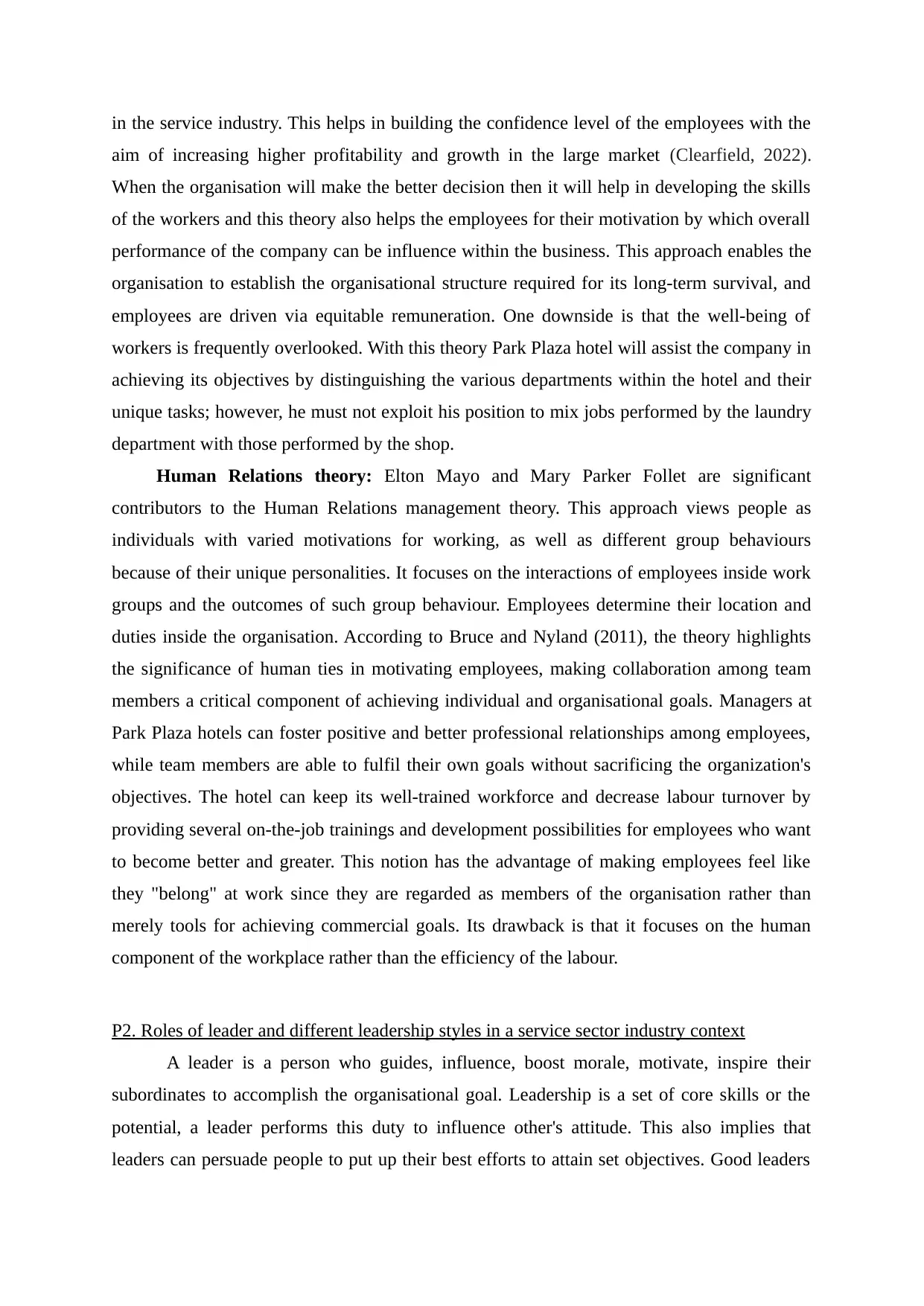
in the service industry. This helps in building the confidence level of the employees with the
aim of increasing higher profitability and growth in the large market (Clearfield, 2022).
When the organisation will make the better decision then it will help in developing the skills
of the workers and this theory also helps the employees for their motivation by which overall
performance of the company can be influence within the business. This approach enables the
organisation to establish the organisational structure required for its long-term survival, and
employees are driven via equitable remuneration. One downside is that the well-being of
workers is frequently overlooked. With this theory Park Plaza hotel will assist the company in
achieving its objectives by distinguishing the various departments within the hotel and their
unique tasks; however, he must not exploit his position to mix jobs performed by the laundry
department with those performed by the shop.
Human Relations theory: Elton Mayo and Mary Parker Follet are significant
contributors to the Human Relations management theory. This approach views people as
individuals with varied motivations for working, as well as different group behaviours
because of their unique personalities. It focuses on the interactions of employees inside work
groups and the outcomes of such group behaviour. Employees determine their location and
duties inside the organisation. According to Bruce and Nyland (2011), the theory highlights
the significance of human ties in motivating employees, making collaboration among team
members a critical component of achieving individual and organisational goals. Managers at
Park Plaza hotels can foster positive and better professional relationships among employees,
while team members are able to fulfil their own goals without sacrificing the organization's
objectives. The hotel can keep its well-trained workforce and decrease labour turnover by
providing several on-the-job trainings and development possibilities for employees who want
to become better and greater. This notion has the advantage of making employees feel like
they "belong" at work since they are regarded as members of the organisation rather than
merely tools for achieving commercial goals. Its drawback is that it focuses on the human
component of the workplace rather than the efficiency of the labour.
P2. Roles of leader and different leadership styles in a service sector industry context
A leader is a person who guides, influence, boost morale, motivate, inspire their
subordinates to accomplish the organisational goal. Leadership is a set of core skills or the
potential, a leader performs this duty to influence other's attitude. This also implies that
leaders can persuade people to put up their best efforts to attain set objectives. Good leaders
aim of increasing higher profitability and growth in the large market (Clearfield, 2022).
When the organisation will make the better decision then it will help in developing the skills
of the workers and this theory also helps the employees for their motivation by which overall
performance of the company can be influence within the business. This approach enables the
organisation to establish the organisational structure required for its long-term survival, and
employees are driven via equitable remuneration. One downside is that the well-being of
workers is frequently overlooked. With this theory Park Plaza hotel will assist the company in
achieving its objectives by distinguishing the various departments within the hotel and their
unique tasks; however, he must not exploit his position to mix jobs performed by the laundry
department with those performed by the shop.
Human Relations theory: Elton Mayo and Mary Parker Follet are significant
contributors to the Human Relations management theory. This approach views people as
individuals with varied motivations for working, as well as different group behaviours
because of their unique personalities. It focuses on the interactions of employees inside work
groups and the outcomes of such group behaviour. Employees determine their location and
duties inside the organisation. According to Bruce and Nyland (2011), the theory highlights
the significance of human ties in motivating employees, making collaboration among team
members a critical component of achieving individual and organisational goals. Managers at
Park Plaza hotels can foster positive and better professional relationships among employees,
while team members are able to fulfil their own goals without sacrificing the organization's
objectives. The hotel can keep its well-trained workforce and decrease labour turnover by
providing several on-the-job trainings and development possibilities for employees who want
to become better and greater. This notion has the advantage of making employees feel like
they "belong" at work since they are regarded as members of the organisation rather than
merely tools for achieving commercial goals. Its drawback is that it focuses on the human
component of the workplace rather than the efficiency of the labour.
P2. Roles of leader and different leadership styles in a service sector industry context
A leader is a person who guides, influence, boost morale, motivate, inspire their
subordinates to accomplish the organisational goal. Leadership is a set of core skills or the
potential, a leader performs this duty to influence other's attitude. This also implies that
leaders can persuade people to put up their best efforts to attain set objectives. Good leaders
Paraphrase This Document
Need a fresh take? Get an instant paraphrase of this document with our AI Paraphraser
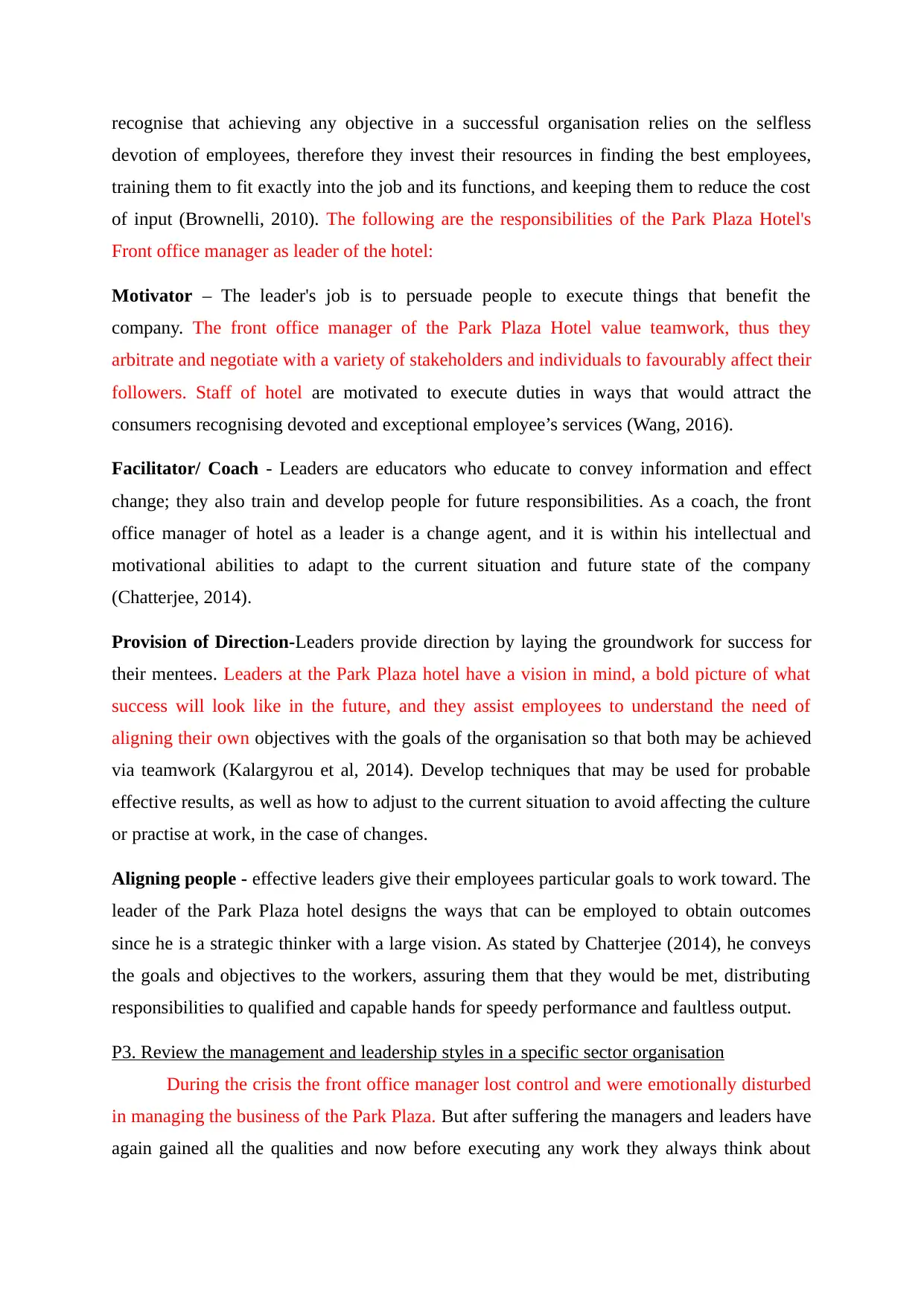
recognise that achieving any objective in a successful organisation relies on the selfless
devotion of employees, therefore they invest their resources in finding the best employees,
training them to fit exactly into the job and its functions, and keeping them to reduce the cost
of input (Brownelli, 2010). The following are the responsibilities of the Park Plaza Hotel's
Front office manager as leader of the hotel:
Motivator – The leader's job is to persuade people to execute things that benefit the
company. The front office manager of the Park Plaza Hotel value teamwork, thus they
arbitrate and negotiate with a variety of stakeholders and individuals to favourably affect their
followers. Staff of hotel are motivated to execute duties in ways that would attract the
consumers recognising devoted and exceptional employee’s services (Wang, 2016).
Facilitator/ Coach - Leaders are educators who educate to convey information and effect
change; they also train and develop people for future responsibilities. As a coach, the front
office manager of hotel as a leader is a change agent, and it is within his intellectual and
motivational abilities to adapt to the current situation and future state of the company
(Chatterjee, 2014).
Provision of Direction-Leaders provide direction by laying the groundwork for success for
their mentees. Leaders at the Park Plaza hotel have a vision in mind, a bold picture of what
success will look like in the future, and they assist employees to understand the need of
aligning their own objectives with the goals of the organisation so that both may be achieved
via teamwork (Kalargyrou et al, 2014). Develop techniques that may be used for probable
effective results, as well as how to adjust to the current situation to avoid affecting the culture
or practise at work, in the case of changes.
Aligning people - effective leaders give their employees particular goals to work toward. The
leader of the Park Plaza hotel designs the ways that can be employed to obtain outcomes
since he is a strategic thinker with a large vision. As stated by Chatterjee (2014), he conveys
the goals and objectives to the workers, assuring them that they would be met, distributing
responsibilities to qualified and capable hands for speedy performance and faultless output.
P3. Review the management and leadership styles in a specific sector organisation
During the crisis the front office manager lost control and were emotionally disturbed
in managing the business of the Park Plaza. But after suffering the managers and leaders have
again gained all the qualities and now before executing any work they always think about
devotion of employees, therefore they invest their resources in finding the best employees,
training them to fit exactly into the job and its functions, and keeping them to reduce the cost
of input (Brownelli, 2010). The following are the responsibilities of the Park Plaza Hotel's
Front office manager as leader of the hotel:
Motivator – The leader's job is to persuade people to execute things that benefit the
company. The front office manager of the Park Plaza Hotel value teamwork, thus they
arbitrate and negotiate with a variety of stakeholders and individuals to favourably affect their
followers. Staff of hotel are motivated to execute duties in ways that would attract the
consumers recognising devoted and exceptional employee’s services (Wang, 2016).
Facilitator/ Coach - Leaders are educators who educate to convey information and effect
change; they also train and develop people for future responsibilities. As a coach, the front
office manager of hotel as a leader is a change agent, and it is within his intellectual and
motivational abilities to adapt to the current situation and future state of the company
(Chatterjee, 2014).
Provision of Direction-Leaders provide direction by laying the groundwork for success for
their mentees. Leaders at the Park Plaza hotel have a vision in mind, a bold picture of what
success will look like in the future, and they assist employees to understand the need of
aligning their own objectives with the goals of the organisation so that both may be achieved
via teamwork (Kalargyrou et al, 2014). Develop techniques that may be used for probable
effective results, as well as how to adjust to the current situation to avoid affecting the culture
or practise at work, in the case of changes.
Aligning people - effective leaders give their employees particular goals to work toward. The
leader of the Park Plaza hotel designs the ways that can be employed to obtain outcomes
since he is a strategic thinker with a large vision. As stated by Chatterjee (2014), he conveys
the goals and objectives to the workers, assuring them that they would be met, distributing
responsibilities to qualified and capable hands for speedy performance and faultless output.
P3. Review the management and leadership styles in a specific sector organisation
During the crisis the front office manager lost control and were emotionally disturbed
in managing the business of the Park Plaza. But after suffering the managers and leaders have
again gained all the qualities and now before executing any work they always think about
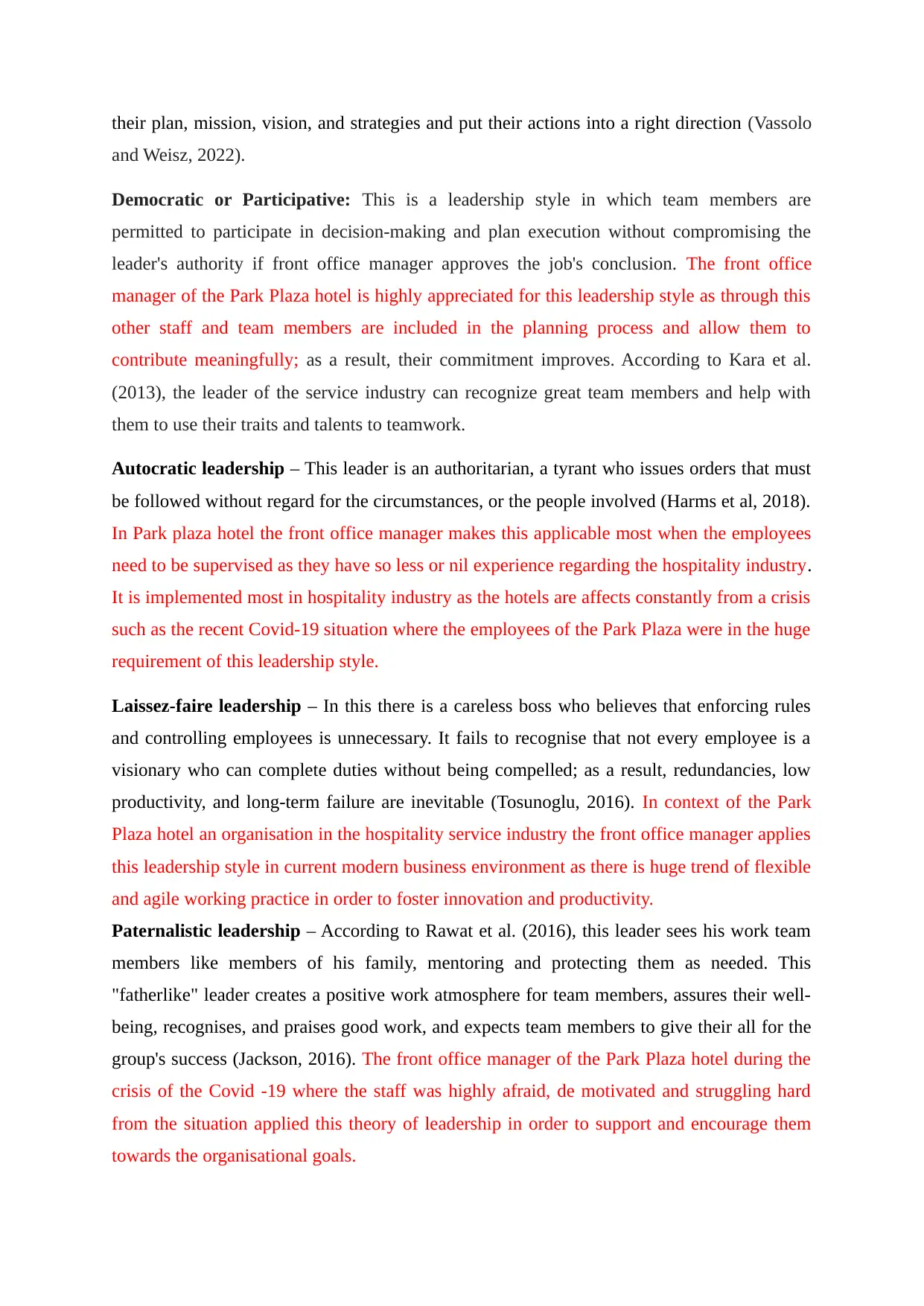
their plan, mission, vision, and strategies and put their actions into a right direction (Vassolo
and Weisz, 2022).
Democratic or Participative: This is a leadership style in which team members are
permitted to participate in decision-making and plan execution without compromising the
leader's authority if front office manager approves the job's conclusion. The front office
manager of the Park Plaza hotel is highly appreciated for this leadership style as through this
other staff and team members are included in the planning process and allow them to
contribute meaningfully; as a result, their commitment improves. According to Kara et al.
(2013), the leader of the service industry can recognize great team members and help with
them to use their traits and talents to teamwork.
Autocratic leadership – This leader is an authoritarian, a tyrant who issues orders that must
be followed without regard for the circumstances, or the people involved (Harms et al, 2018).
In Park plaza hotel the front office manager makes this applicable most when the employees
need to be supervised as they have so less or nil experience regarding the hospitality industry.
It is implemented most in hospitality industry as the hotels are affects constantly from a crisis
such as the recent Covid-19 situation where the employees of the Park Plaza were in the huge
requirement of this leadership style.
Laissez-faire leadership – In this there is a careless boss who believes that enforcing rules
and controlling employees is unnecessary. It fails to recognise that not every employee is a
visionary who can complete duties without being compelled; as a result, redundancies, low
productivity, and long-term failure are inevitable (Tosunoglu, 2016). In context of the Park
Plaza hotel an organisation in the hospitality service industry the front office manager applies
this leadership style in current modern business environment as there is huge trend of flexible
and agile working practice in order to foster innovation and productivity.
Paternalistic leadership – According to Rawat et al. (2016), this leader sees his work team
members like members of his family, mentoring and protecting them as needed. This
"fatherlike" leader creates a positive work atmosphere for team members, assures their well-
being, recognises, and praises good work, and expects team members to give their all for the
group's success (Jackson, 2016). The front office manager of the Park Plaza hotel during the
crisis of the Covid -19 where the staff was highly afraid, de motivated and struggling hard
from the situation applied this theory of leadership in order to support and encourage them
towards the organisational goals.
and Weisz, 2022).
Democratic or Participative: This is a leadership style in which team members are
permitted to participate in decision-making and plan execution without compromising the
leader's authority if front office manager approves the job's conclusion. The front office
manager of the Park Plaza hotel is highly appreciated for this leadership style as through this
other staff and team members are included in the planning process and allow them to
contribute meaningfully; as a result, their commitment improves. According to Kara et al.
(2013), the leader of the service industry can recognize great team members and help with
them to use their traits and talents to teamwork.
Autocratic leadership – This leader is an authoritarian, a tyrant who issues orders that must
be followed without regard for the circumstances, or the people involved (Harms et al, 2018).
In Park plaza hotel the front office manager makes this applicable most when the employees
need to be supervised as they have so less or nil experience regarding the hospitality industry.
It is implemented most in hospitality industry as the hotels are affects constantly from a crisis
such as the recent Covid-19 situation where the employees of the Park Plaza were in the huge
requirement of this leadership style.
Laissez-faire leadership – In this there is a careless boss who believes that enforcing rules
and controlling employees is unnecessary. It fails to recognise that not every employee is a
visionary who can complete duties without being compelled; as a result, redundancies, low
productivity, and long-term failure are inevitable (Tosunoglu, 2016). In context of the Park
Plaza hotel an organisation in the hospitality service industry the front office manager applies
this leadership style in current modern business environment as there is huge trend of flexible
and agile working practice in order to foster innovation and productivity.
Paternalistic leadership – According to Rawat et al. (2016), this leader sees his work team
members like members of his family, mentoring and protecting them as needed. This
"fatherlike" leader creates a positive work atmosphere for team members, assures their well-
being, recognises, and praises good work, and expects team members to give their all for the
group's success (Jackson, 2016). The front office manager of the Park Plaza hotel during the
crisis of the Covid -19 where the staff was highly afraid, de motivated and struggling hard
from the situation applied this theory of leadership in order to support and encourage them
towards the organisational goals.
⊘ This is a preview!⊘
Do you want full access?
Subscribe today to unlock all pages.

Trusted by 1+ million students worldwide
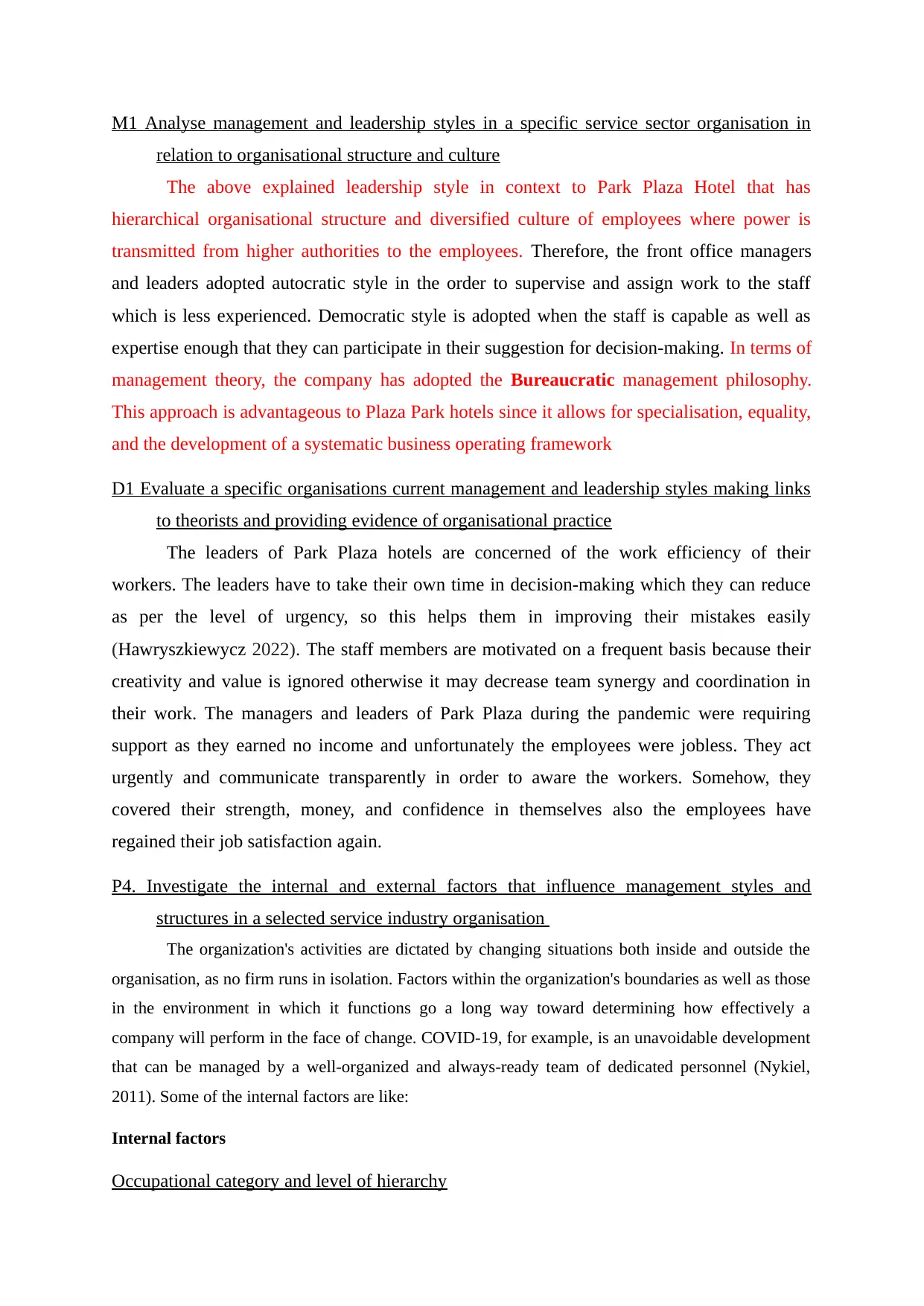
M1 Analyse management and leadership styles in a specific service sector organisation in
relation to organisational structure and culture
The above explained leadership style in context to Park Plaza Hotel that has
hierarchical organisational structure and diversified culture of employees where power is
transmitted from higher authorities to the employees. Therefore, the front office managers
and leaders adopted autocratic style in the order to supervise and assign work to the staff
which is less experienced. Democratic style is adopted when the staff is capable as well as
expertise enough that they can participate in their suggestion for decision-making. In terms of
management theory, the company has adopted the Bureaucratic management philosophy.
This approach is advantageous to Plaza Park hotels since it allows for specialisation, equality,
and the development of a systematic business operating framework
D1 Evaluate a specific organisations current management and leadership styles making links
to theorists and providing evidence of organisational practice
The leaders of Park Plaza hotels are concerned of the work efficiency of their
workers. The leaders have to take their own time in decision-making which they can reduce
as per the level of urgency, so this helps them in improving their mistakes easily
(Hawryszkiewycz 2022). The staff members are motivated on a frequent basis because their
creativity and value is ignored otherwise it may decrease team synergy and coordination in
their work. The managers and leaders of Park Plaza during the pandemic were requiring
support as they earned no income and unfortunately the employees were jobless. They act
urgently and communicate transparently in order to aware the workers. Somehow, they
covered their strength, money, and confidence in themselves also the employees have
regained their job satisfaction again.
P4. Investigate the internal and external factors that influence management styles and
structures in a selected service industry organisation
The organization's activities are dictated by changing situations both inside and outside the
organisation, as no firm runs in isolation. Factors within the organization's boundaries as well as those
in the environment in which it functions go a long way toward determining how effectively a
company will perform in the face of change. COVID-19, for example, is an unavoidable development
that can be managed by a well-organized and always-ready team of dedicated personnel (Nykiel,
2011). Some of the internal factors are like:
Internal factors
Occupational category and level of hierarchy
relation to organisational structure and culture
The above explained leadership style in context to Park Plaza Hotel that has
hierarchical organisational structure and diversified culture of employees where power is
transmitted from higher authorities to the employees. Therefore, the front office managers
and leaders adopted autocratic style in the order to supervise and assign work to the staff
which is less experienced. Democratic style is adopted when the staff is capable as well as
expertise enough that they can participate in their suggestion for decision-making. In terms of
management theory, the company has adopted the Bureaucratic management philosophy.
This approach is advantageous to Plaza Park hotels since it allows for specialisation, equality,
and the development of a systematic business operating framework
D1 Evaluate a specific organisations current management and leadership styles making links
to theorists and providing evidence of organisational practice
The leaders of Park Plaza hotels are concerned of the work efficiency of their
workers. The leaders have to take their own time in decision-making which they can reduce
as per the level of urgency, so this helps them in improving their mistakes easily
(Hawryszkiewycz 2022). The staff members are motivated on a frequent basis because their
creativity and value is ignored otherwise it may decrease team synergy and coordination in
their work. The managers and leaders of Park Plaza during the pandemic were requiring
support as they earned no income and unfortunately the employees were jobless. They act
urgently and communicate transparently in order to aware the workers. Somehow, they
covered their strength, money, and confidence in themselves also the employees have
regained their job satisfaction again.
P4. Investigate the internal and external factors that influence management styles and
structures in a selected service industry organisation
The organization's activities are dictated by changing situations both inside and outside the
organisation, as no firm runs in isolation. Factors within the organization's boundaries as well as those
in the environment in which it functions go a long way toward determining how effectively a
company will perform in the face of change. COVID-19, for example, is an unavoidable development
that can be managed by a well-organized and always-ready team of dedicated personnel (Nykiel,
2011). Some of the internal factors are like:
Internal factors
Occupational category and level of hierarchy
Paraphrase This Document
Need a fresh take? Get an instant paraphrase of this document with our AI Paraphraser
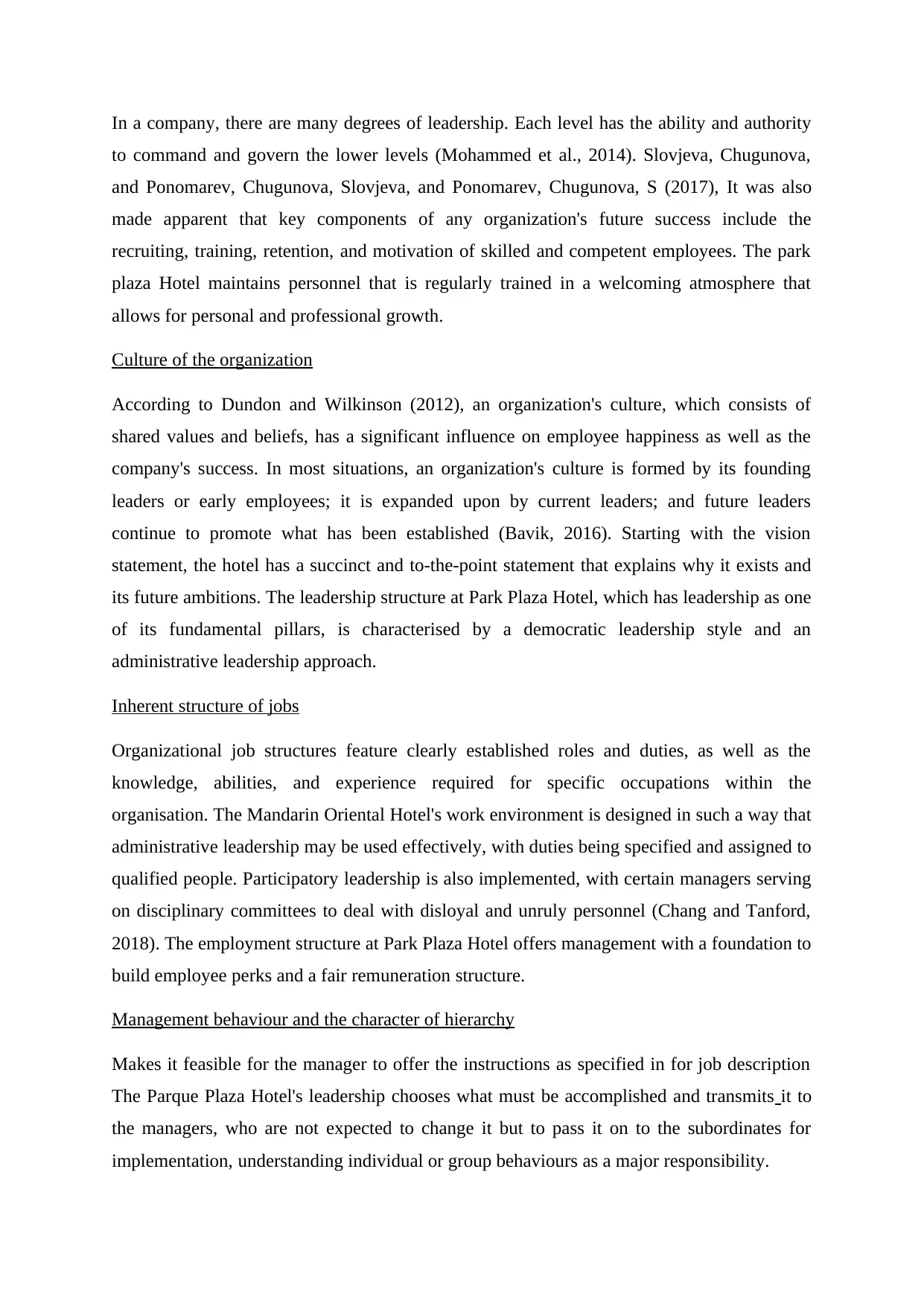
In a company, there are many degrees of leadership. Each level has the ability and authority
to command and govern the lower levels (Mohammed et al., 2014). Slovjeva, Chugunova,
and Ponomarev, Chugunova, Slovjeva, and Ponomarev, Chugunova, S (2017), It was also
made apparent that key components of any organization's future success include the
recruiting, training, retention, and motivation of skilled and competent employees. The park
plaza Hotel maintains personnel that is regularly trained in a welcoming atmosphere that
allows for personal and professional growth.
Culture of the organization
According to Dundon and Wilkinson (2012), an organization's culture, which consists of
shared values and beliefs, has a significant influence on employee happiness as well as the
company's success. In most situations, an organization's culture is formed by its founding
leaders or early employees; it is expanded upon by current leaders; and future leaders
continue to promote what has been established (Bavik, 2016). Starting with the vision
statement, the hotel has a succinct and to-the-point statement that explains why it exists and
its future ambitions. The leadership structure at Park Plaza Hotel, which has leadership as one
of its fundamental pillars, is characterised by a democratic leadership style and an
administrative leadership approach.
Inherent structure of jobs
Organizational job structures feature clearly established roles and duties, as well as the
knowledge, abilities, and experience required for specific occupations within the
organisation. The Mandarin Oriental Hotel's work environment is designed in such a way that
administrative leadership may be used effectively, with duties being specified and assigned to
qualified people. Participatory leadership is also implemented, with certain managers serving
on disciplinary committees to deal with disloyal and unruly personnel (Chang and Tanford,
2018). The employment structure at Park Plaza Hotel offers management with a foundation to
build employee perks and a fair remuneration structure.
Management behaviour and the character of hierarchy
Makes it feasible for the manager to offer the instructions as specified in for job description
The Parque Plaza Hotel's leadership chooses what must be accomplished and transmits it to
the managers, who are not expected to change it but to pass it on to the subordinates for
implementation, understanding individual or group behaviours as a major responsibility.
to command and govern the lower levels (Mohammed et al., 2014). Slovjeva, Chugunova,
and Ponomarev, Chugunova, Slovjeva, and Ponomarev, Chugunova, S (2017), It was also
made apparent that key components of any organization's future success include the
recruiting, training, retention, and motivation of skilled and competent employees. The park
plaza Hotel maintains personnel that is regularly trained in a welcoming atmosphere that
allows for personal and professional growth.
Culture of the organization
According to Dundon and Wilkinson (2012), an organization's culture, which consists of
shared values and beliefs, has a significant influence on employee happiness as well as the
company's success. In most situations, an organization's culture is formed by its founding
leaders or early employees; it is expanded upon by current leaders; and future leaders
continue to promote what has been established (Bavik, 2016). Starting with the vision
statement, the hotel has a succinct and to-the-point statement that explains why it exists and
its future ambitions. The leadership structure at Park Plaza Hotel, which has leadership as one
of its fundamental pillars, is characterised by a democratic leadership style and an
administrative leadership approach.
Inherent structure of jobs
Organizational job structures feature clearly established roles and duties, as well as the
knowledge, abilities, and experience required for specific occupations within the
organisation. The Mandarin Oriental Hotel's work environment is designed in such a way that
administrative leadership may be used effectively, with duties being specified and assigned to
qualified people. Participatory leadership is also implemented, with certain managers serving
on disciplinary committees to deal with disloyal and unruly personnel (Chang and Tanford,
2018). The employment structure at Park Plaza Hotel offers management with a foundation to
build employee perks and a fair remuneration structure.
Management behaviour and the character of hierarchy
Makes it feasible for the manager to offer the instructions as specified in for job description
The Parque Plaza Hotel's leadership chooses what must be accomplished and transmits it to
the managers, who are not expected to change it but to pass it on to the subordinates for
implementation, understanding individual or group behaviours as a major responsibility.
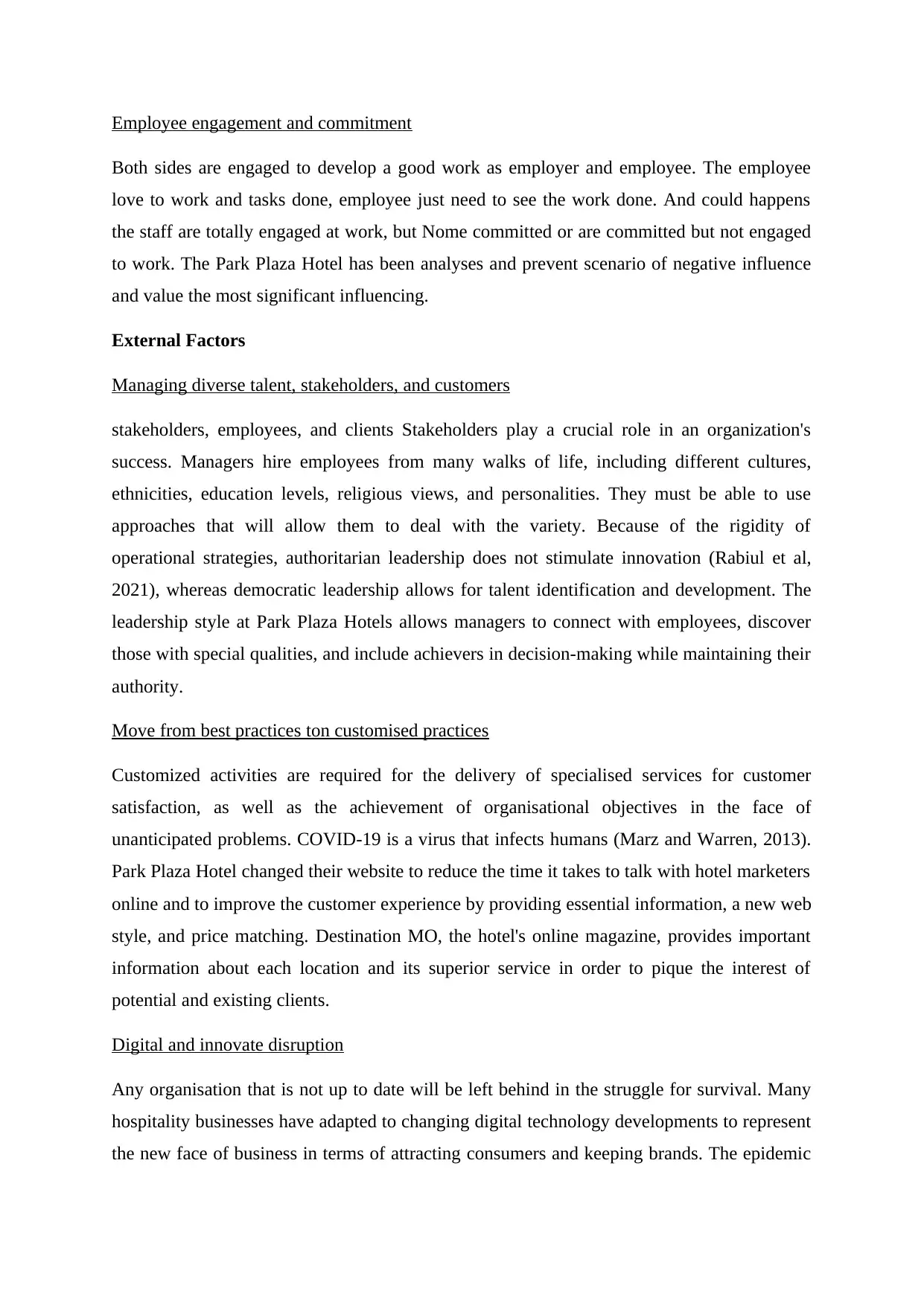
Employee engagement and commitment
Both sides are engaged to develop a good work as employer and employee. The employee
love to work and tasks done, employee just need to see the work done. And could happens
the staff are totally engaged at work, but Nome committed or are committed but not engaged
to work. The Park Plaza Hotel has been analyses and prevent scenario of negative influence
and value the most significant influencing.
External Factors
Managing diverse talent, stakeholders, and customers
stakeholders, employees, and clients Stakeholders play a crucial role in an organization's
success. Managers hire employees from many walks of life, including different cultures,
ethnicities, education levels, religious views, and personalities. They must be able to use
approaches that will allow them to deal with the variety. Because of the rigidity of
operational strategies, authoritarian leadership does not stimulate innovation (Rabiul et al,
2021), whereas democratic leadership allows for talent identification and development. The
leadership style at Park Plaza Hotels allows managers to connect with employees, discover
those with special qualities, and include achievers in decision-making while maintaining their
authority.
Move from best practices ton customised practices
Customized activities are required for the delivery of specialised services for customer
satisfaction, as well as the achievement of organisational objectives in the face of
unanticipated problems. COVID-19 is a virus that infects humans (Marz and Warren, 2013).
Park Plaza Hotel changed their website to reduce the time it takes to talk with hotel marketers
online and to improve the customer experience by providing essential information, a new web
style, and price matching. Destination MO, the hotel's online magazine, provides important
information about each location and its superior service in order to pique the interest of
potential and existing clients.
Digital and innovate disruption
Any organisation that is not up to date will be left behind in the struggle for survival. Many
hospitality businesses have adapted to changing digital technology developments to represent
the new face of business in terms of attracting consumers and keeping brands. The epidemic
Both sides are engaged to develop a good work as employer and employee. The employee
love to work and tasks done, employee just need to see the work done. And could happens
the staff are totally engaged at work, but Nome committed or are committed but not engaged
to work. The Park Plaza Hotel has been analyses and prevent scenario of negative influence
and value the most significant influencing.
External Factors
Managing diverse talent, stakeholders, and customers
stakeholders, employees, and clients Stakeholders play a crucial role in an organization's
success. Managers hire employees from many walks of life, including different cultures,
ethnicities, education levels, religious views, and personalities. They must be able to use
approaches that will allow them to deal with the variety. Because of the rigidity of
operational strategies, authoritarian leadership does not stimulate innovation (Rabiul et al,
2021), whereas democratic leadership allows for talent identification and development. The
leadership style at Park Plaza Hotels allows managers to connect with employees, discover
those with special qualities, and include achievers in decision-making while maintaining their
authority.
Move from best practices ton customised practices
Customized activities are required for the delivery of specialised services for customer
satisfaction, as well as the achievement of organisational objectives in the face of
unanticipated problems. COVID-19 is a virus that infects humans (Marz and Warren, 2013).
Park Plaza Hotel changed their website to reduce the time it takes to talk with hotel marketers
online and to improve the customer experience by providing essential information, a new web
style, and price matching. Destination MO, the hotel's online magazine, provides important
information about each location and its superior service in order to pique the interest of
potential and existing clients.
Digital and innovate disruption
Any organisation that is not up to date will be left behind in the struggle for survival. Many
hospitality businesses have adapted to changing digital technology developments to represent
the new face of business in terms of attracting consumers and keeping brands. The epidemic
⊘ This is a preview!⊘
Do you want full access?
Subscribe today to unlock all pages.

Trusted by 1+ million students worldwide
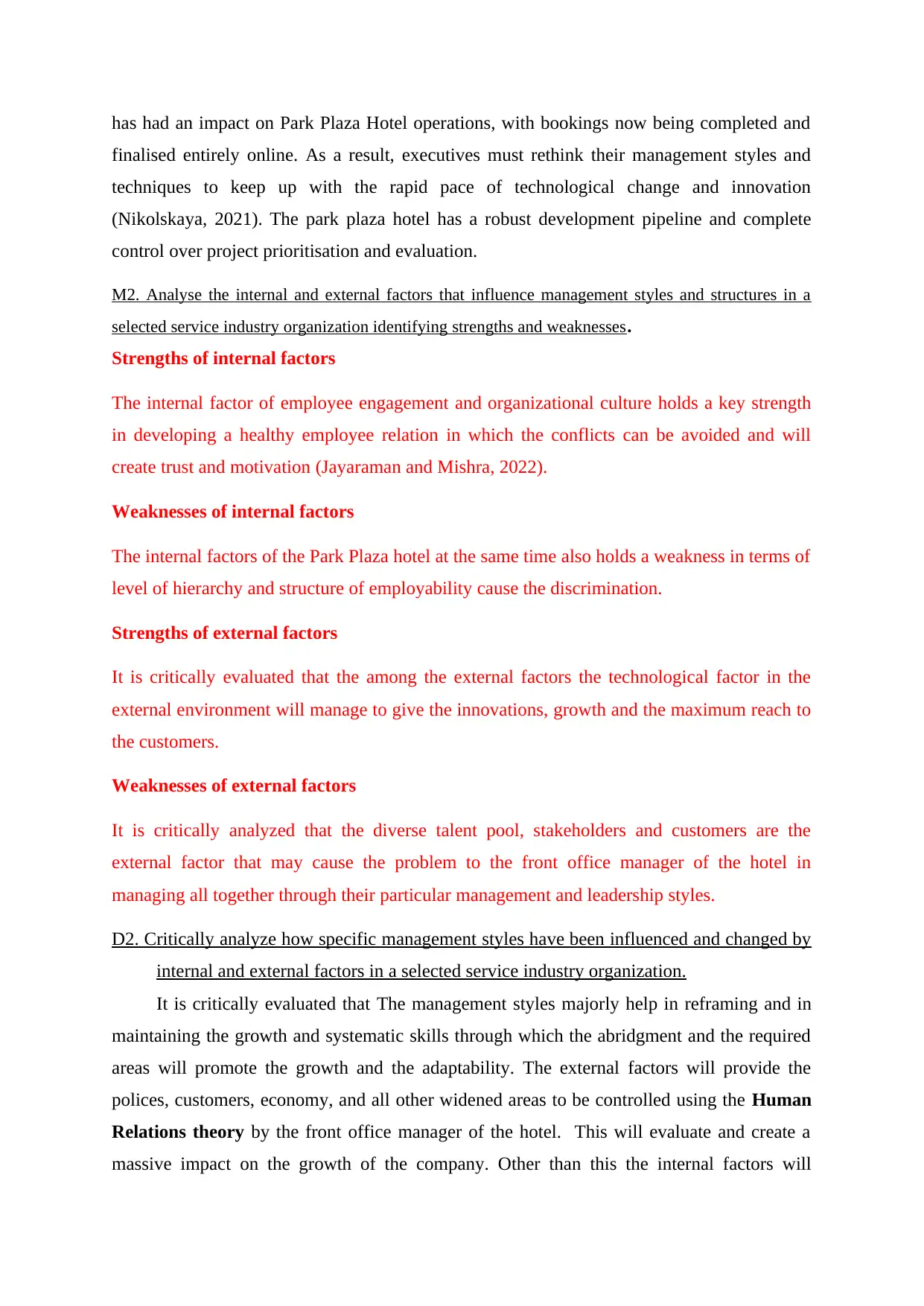
has had an impact on Park Plaza Hotel operations, with bookings now being completed and
finalised entirely online. As a result, executives must rethink their management styles and
techniques to keep up with the rapid pace of technological change and innovation
(Nikolskaya, 2021). The park plaza hotel has a robust development pipeline and complete
control over project prioritisation and evaluation.
M2. Analyse the internal and external factors that influence management styles and structures in a
selected service industry organization identifying strengths and weaknesses.
Strengths of internal factors
The internal factor of employee engagement and organizational culture holds a key strength
in developing a healthy employee relation in which the conflicts can be avoided and will
create trust and motivation (Jayaraman and Mishra, 2022).
Weaknesses of internal factors
The internal factors of the Park Plaza hotel at the same time also holds a weakness in terms of
level of hierarchy and structure of employability cause the discrimination.
Strengths of external factors
It is critically evaluated that the among the external factors the technological factor in the
external environment will manage to give the innovations, growth and the maximum reach to
the customers.
Weaknesses of external factors
It is critically analyzed that the diverse talent pool, stakeholders and customers are the
external factor that may cause the problem to the front office manager of the hotel in
managing all together through their particular management and leadership styles.
D2. Critically analyze how specific management styles have been influenced and changed by
internal and external factors in a selected service industry organization.
It is critically evaluated that The management styles majorly help in reframing and in
maintaining the growth and systematic skills through which the abridgment and the required
areas will promote the growth and the adaptability. The external factors will provide the
polices, customers, economy, and all other widened areas to be controlled using the Human
Relations theory by the front office manager of the hotel. This will evaluate and create a
massive impact on the growth of the company. Other than this the internal factors will
finalised entirely online. As a result, executives must rethink their management styles and
techniques to keep up with the rapid pace of technological change and innovation
(Nikolskaya, 2021). The park plaza hotel has a robust development pipeline and complete
control over project prioritisation and evaluation.
M2. Analyse the internal and external factors that influence management styles and structures in a
selected service industry organization identifying strengths and weaknesses.
Strengths of internal factors
The internal factor of employee engagement and organizational culture holds a key strength
in developing a healthy employee relation in which the conflicts can be avoided and will
create trust and motivation (Jayaraman and Mishra, 2022).
Weaknesses of internal factors
The internal factors of the Park Plaza hotel at the same time also holds a weakness in terms of
level of hierarchy and structure of employability cause the discrimination.
Strengths of external factors
It is critically evaluated that the among the external factors the technological factor in the
external environment will manage to give the innovations, growth and the maximum reach to
the customers.
Weaknesses of external factors
It is critically analyzed that the diverse talent pool, stakeholders and customers are the
external factor that may cause the problem to the front office manager of the hotel in
managing all together through their particular management and leadership styles.
D2. Critically analyze how specific management styles have been influenced and changed by
internal and external factors in a selected service industry organization.
It is critically evaluated that The management styles majorly help in reframing and in
maintaining the growth and systematic skills through which the abridgment and the required
areas will promote the growth and the adaptability. The external factors will provide the
polices, customers, economy, and all other widened areas to be controlled using the Human
Relations theory by the front office manager of the hotel. This will evaluate and create a
massive impact on the growth of the company. Other than this the internal factors will
Paraphrase This Document
Need a fresh take? Get an instant paraphrase of this document with our AI Paraphraser
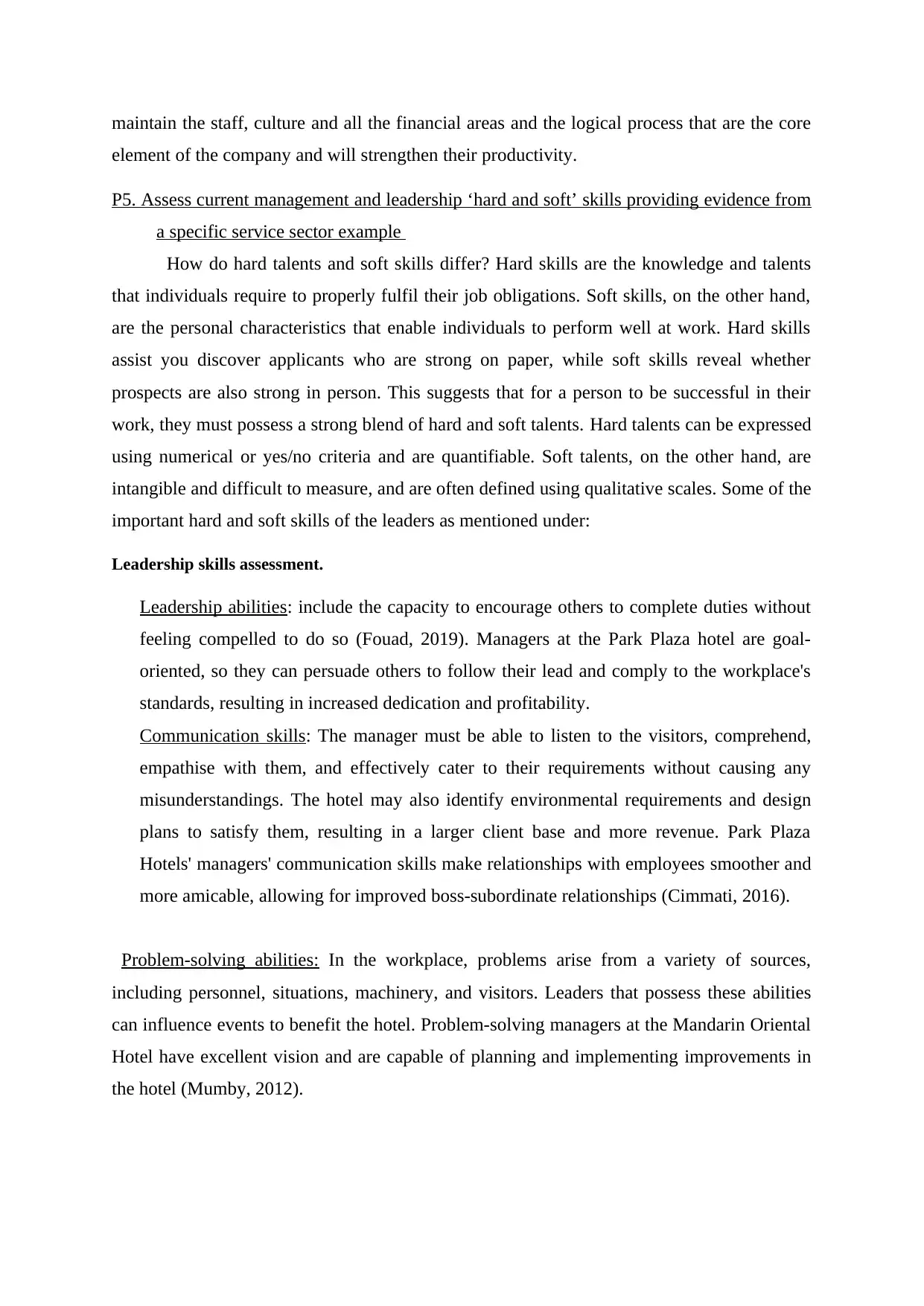
maintain the staff, culture and all the financial areas and the logical process that are the core
element of the company and will strengthen their productivity.
P5. Assess current management and leadership ‘hard and soft’ skills providing evidence from
a specific service sector example
How do hard talents and soft skills differ? Hard skills are the knowledge and talents
that individuals require to properly fulfil their job obligations. Soft skills, on the other hand,
are the personal characteristics that enable individuals to perform well at work. Hard skills
assist you discover applicants who are strong on paper, while soft skills reveal whether
prospects are also strong in person. This suggests that for a person to be successful in their
work, they must possess a strong blend of hard and soft talents. Hard talents can be expressed
using numerical or yes/no criteria and are quantifiable. Soft talents, on the other hand, are
intangible and difficult to measure, and are often defined using qualitative scales. Some of the
important hard and soft skills of the leaders as mentioned under:
Leadership skills assessment.
Leadership abilities: include the capacity to encourage others to complete duties without
feeling compelled to do so (Fouad, 2019). Managers at the Park Plaza hotel are goal-
oriented, so they can persuade others to follow their lead and comply to the workplace's
standards, resulting in increased dedication and profitability.
Communication skills: The manager must be able to listen to the visitors, comprehend,
empathise with them, and effectively cater to their requirements without causing any
misunderstandings. The hotel may also identify environmental requirements and design
plans to satisfy them, resulting in a larger client base and more revenue. Park Plaza
Hotels' managers' communication skills make relationships with employees smoother and
more amicable, allowing for improved boss-subordinate relationships (Cimmati, 2016).
Problem-solving abilities: In the workplace, problems arise from a variety of sources,
including personnel, situations, machinery, and visitors. Leaders that possess these abilities
can influence events to benefit the hotel. Problem-solving managers at the Mandarin Oriental
Hotel have excellent vision and are capable of planning and implementing improvements in
the hotel (Mumby, 2012).
element of the company and will strengthen their productivity.
P5. Assess current management and leadership ‘hard and soft’ skills providing evidence from
a specific service sector example
How do hard talents and soft skills differ? Hard skills are the knowledge and talents
that individuals require to properly fulfil their job obligations. Soft skills, on the other hand,
are the personal characteristics that enable individuals to perform well at work. Hard skills
assist you discover applicants who are strong on paper, while soft skills reveal whether
prospects are also strong in person. This suggests that for a person to be successful in their
work, they must possess a strong blend of hard and soft talents. Hard talents can be expressed
using numerical or yes/no criteria and are quantifiable. Soft talents, on the other hand, are
intangible and difficult to measure, and are often defined using qualitative scales. Some of the
important hard and soft skills of the leaders as mentioned under:
Leadership skills assessment.
Leadership abilities: include the capacity to encourage others to complete duties without
feeling compelled to do so (Fouad, 2019). Managers at the Park Plaza hotel are goal-
oriented, so they can persuade others to follow their lead and comply to the workplace's
standards, resulting in increased dedication and profitability.
Communication skills: The manager must be able to listen to the visitors, comprehend,
empathise with them, and effectively cater to their requirements without causing any
misunderstandings. The hotel may also identify environmental requirements and design
plans to satisfy them, resulting in a larger client base and more revenue. Park Plaza
Hotels' managers' communication skills make relationships with employees smoother and
more amicable, allowing for improved boss-subordinate relationships (Cimmati, 2016).
Problem-solving abilities: In the workplace, problems arise from a variety of sources,
including personnel, situations, machinery, and visitors. Leaders that possess these abilities
can influence events to benefit the hotel. Problem-solving managers at the Mandarin Oriental
Hotel have excellent vision and are capable of planning and implementing improvements in
the hotel (Mumby, 2012).
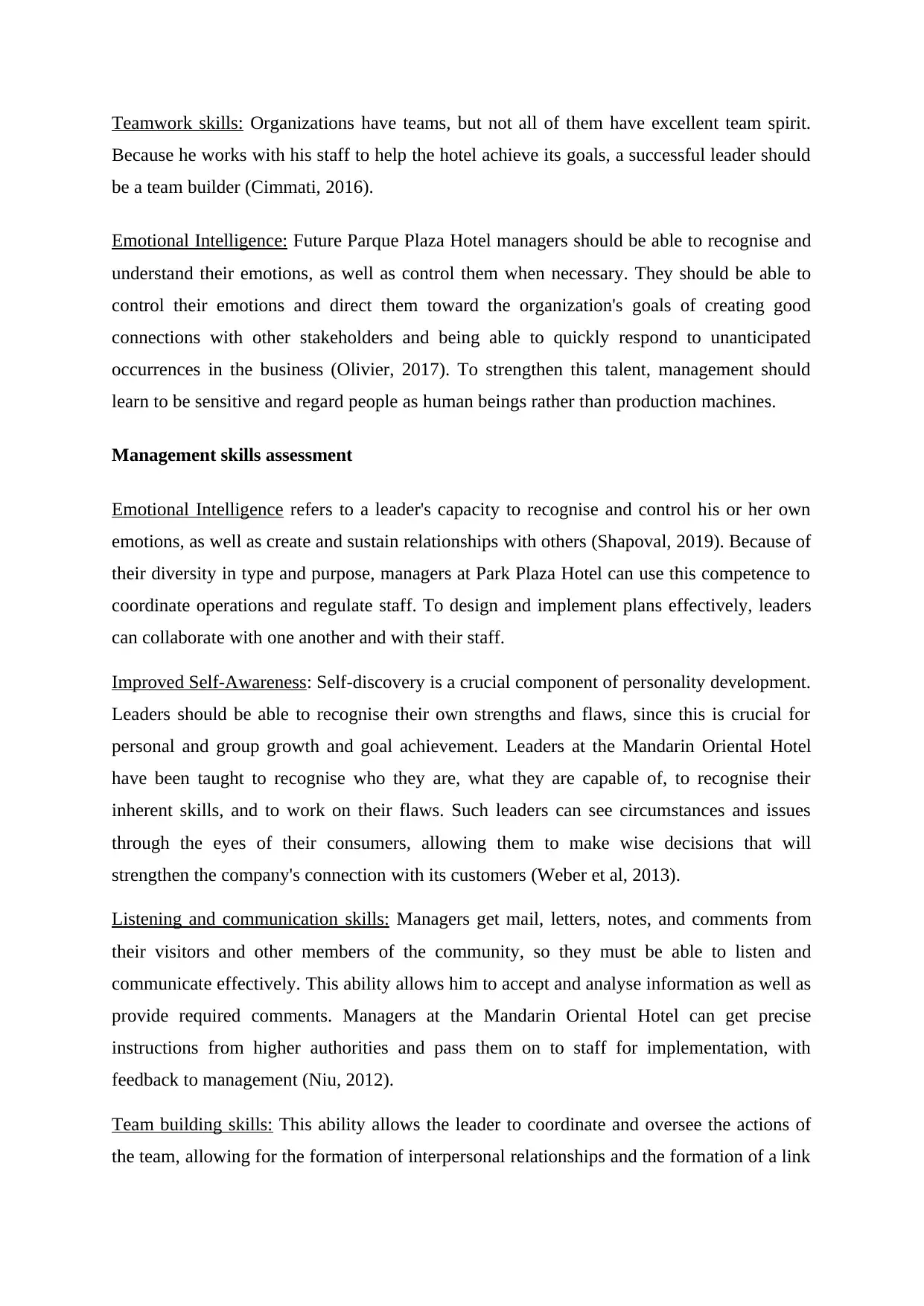
Teamwork skills: Organizations have teams, but not all of them have excellent team spirit.
Because he works with his staff to help the hotel achieve its goals, a successful leader should
be a team builder (Cimmati, 2016).
Emotional Intelligence: Future Parque Plaza Hotel managers should be able to recognise and
understand their emotions, as well as control them when necessary. They should be able to
control their emotions and direct them toward the organization's goals of creating good
connections with other stakeholders and being able to quickly respond to unanticipated
occurrences in the business (Olivier, 2017). To strengthen this talent, management should
learn to be sensitive and regard people as human beings rather than production machines.
Management skills assessment
Emotional Intelligence refers to a leader's capacity to recognise and control his or her own
emotions, as well as create and sustain relationships with others (Shapoval, 2019). Because of
their diversity in type and purpose, managers at Park Plaza Hotel can use this competence to
coordinate operations and regulate staff. To design and implement plans effectively, leaders
can collaborate with one another and with their staff.
Improved Self-Awareness: Self-discovery is a crucial component of personality development.
Leaders should be able to recognise their own strengths and flaws, since this is crucial for
personal and group growth and goal achievement. Leaders at the Mandarin Oriental Hotel
have been taught to recognise who they are, what they are capable of, to recognise their
inherent skills, and to work on their flaws. Such leaders can see circumstances and issues
through the eyes of their consumers, allowing them to make wise decisions that will
strengthen the company's connection with its customers (Weber et al, 2013).
Listening and communication skills: Managers get mail, letters, notes, and comments from
their visitors and other members of the community, so they must be able to listen and
communicate effectively. This ability allows him to accept and analyse information as well as
provide required comments. Managers at the Mandarin Oriental Hotel can get precise
instructions from higher authorities and pass them on to staff for implementation, with
feedback to management (Niu, 2012).
Team building skills: This ability allows the leader to coordinate and oversee the actions of
the team, allowing for the formation of interpersonal relationships and the formation of a link
Because he works with his staff to help the hotel achieve its goals, a successful leader should
be a team builder (Cimmati, 2016).
Emotional Intelligence: Future Parque Plaza Hotel managers should be able to recognise and
understand their emotions, as well as control them when necessary. They should be able to
control their emotions and direct them toward the organization's goals of creating good
connections with other stakeholders and being able to quickly respond to unanticipated
occurrences in the business (Olivier, 2017). To strengthen this talent, management should
learn to be sensitive and regard people as human beings rather than production machines.
Management skills assessment
Emotional Intelligence refers to a leader's capacity to recognise and control his or her own
emotions, as well as create and sustain relationships with others (Shapoval, 2019). Because of
their diversity in type and purpose, managers at Park Plaza Hotel can use this competence to
coordinate operations and regulate staff. To design and implement plans effectively, leaders
can collaborate with one another and with their staff.
Improved Self-Awareness: Self-discovery is a crucial component of personality development.
Leaders should be able to recognise their own strengths and flaws, since this is crucial for
personal and group growth and goal achievement. Leaders at the Mandarin Oriental Hotel
have been taught to recognise who they are, what they are capable of, to recognise their
inherent skills, and to work on their flaws. Such leaders can see circumstances and issues
through the eyes of their consumers, allowing them to make wise decisions that will
strengthen the company's connection with its customers (Weber et al, 2013).
Listening and communication skills: Managers get mail, letters, notes, and comments from
their visitors and other members of the community, so they must be able to listen and
communicate effectively. This ability allows him to accept and analyse information as well as
provide required comments. Managers at the Mandarin Oriental Hotel can get precise
instructions from higher authorities and pass them on to staff for implementation, with
feedback to management (Niu, 2012).
Team building skills: This ability allows the leader to coordinate and oversee the actions of
the team, allowing for the formation of interpersonal relationships and the formation of a link
⊘ This is a preview!⊘
Do you want full access?
Subscribe today to unlock all pages.

Trusted by 1+ million students worldwide
1 out of 22
Related Documents
Your All-in-One AI-Powered Toolkit for Academic Success.
+13062052269
info@desklib.com
Available 24*7 on WhatsApp / Email
![[object Object]](/_next/static/media/star-bottom.7253800d.svg)
Unlock your academic potential
Copyright © 2020–2026 A2Z Services. All Rights Reserved. Developed and managed by ZUCOL.


